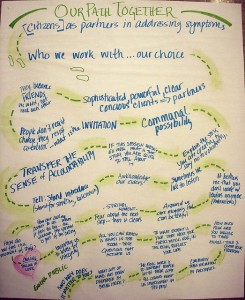 Tim Bonneman blogged yesterday about the International Association of Facilitators “International Facilitation Week.” He pondered…
Tim Bonneman blogged yesterday about the International Association of Facilitators “International Facilitation Week.” He pondered…
I wonder if anyone is planning any events related specifically to online facilitation.
I started to comment on Tim’s blog, but realized the length of my response suggested I blog here and link back, so here goes…
Hiya Tim,
I think this is an excellent idea and, alas, for me, the timing sucks. I have put a red line on my to do list promising myself not to bite of anything else. (I’m doing an action research project on how to usefully evaluate the socio-technical stuff associated with organizations’ “collaboration platforms!!” And yes, i bit off WAY more than I should have! See this previous post)
But I think your idea is really good and that there is a network of people out there that would benefit from a week of distributed connection, learning and reflection.
Online facilitation practice has diversified since I jumped in in 1996. Some of those sub areas have matured. For example, the practices around “online community management/facilitation” have had great stewardship by folks such as the Online Community Roundtable (Shout out to Rachel Happe and friends) and others, and there have been really interesting developments in the facilitation of learning online (see Tony Carr’s work and kudos for pulling together some seminal work around facilitation of learning at University of Cape Town in South Africa). There new generation of online community people who are (re)discovering practices us old timers used back in the early online facilitation days, and adapting and expanding them in new ways and for new contexts.
The proliferation of tools, particularly tools that enable connection outside of bounded groups (such as Twitter, Facebook, and previously the emergent networks that were formed BETWEEN blogs and commentors) has led us to an era that is not just about online group facilitation, but online network stimulation and facilitation. June Holley’s work in network weaving (which to me is still a lot about bounded groups but working in unbounded spaces) is an example.
These tools have also greatly expanded the possibilities of dispersed collaboration, but I have to say, this seems like an area where a few have succeeded (some wildly) and many have been left with grand dreams that turned to empty promises. I think this is because we are talking about facilitating both between people and between organizations and their politics, policies and structures. So we have a blend of facilitation and organizational development, if you will.
So the field is rich for reflection and ripe for dreaming.
Nancy